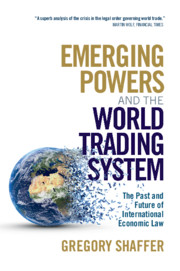Book contents
- Reviews
- Emerging Powers and the World Trading System
- Emerging Powers and the World Trading System
- Copyright page
- Dedication
- Contents
- Figures
- Tables
- Preface: The Project and Its Methodology
- Part I Legal Capacity and Transnational Legal Orders
- 1 Introduction
- 2 The Theory: Building Trade Law Capacity in Emerging Powers and Its Implications
- 3 The Challenges of International Trade Law
- Part II The Cases of Brazil, India, and China
- Part III The Future of the Transnational Legal Order for Trade
- Acknowledgments
- Abbreviations
1 - Introduction
Emerging Powers and the Transnational Legal Ordering of Trade
from Part I - Legal Capacity and Transnational Legal Orders
Published online by Cambridge University Press: 23 July 2021
- Reviews
- Emerging Powers and the World Trading System
- Emerging Powers and the World Trading System
- Copyright page
- Dedication
- Contents
- Figures
- Tables
- Preface: The Project and Its Methodology
- Part I Legal Capacity and Transnational Legal Orders
- 1 Introduction
- 2 The Theory: Building Trade Law Capacity in Emerging Powers and Its Implications
- 3 The Challenges of International Trade Law
- Part II The Cases of Brazil, India, and China
- Part III The Future of the Transnational Legal Order for Trade
- Acknowledgments
- Abbreviations
Summary
Victorious after World War II and the Cold War, the United States and its allies largely wrote the rules for international trade and investment. Critically, the United States and European Union drove the creation of the World Trade Organization (WTO) in 1995 with the aim of opening trade in goods and services for their products, ramping up protection for their intellectual property, and transforming national trade-related law and institutions within countries around the world to look more like American and European law and institutions. Developing countries joined the WTO but often complained that its rules were skewed. As a result, it was argued that the United States and European Union could rule the global economy through rules. They were incredibly successful, as WTO norms transformed laws and institutions within emerging economies.
Information
- Type
- Chapter
- Information
- Emerging Powers and the World Trading SystemThe Past and Future of International Economic Law, pp. 3 - 21Publisher: Cambridge University PressPrint publication year: 2021
